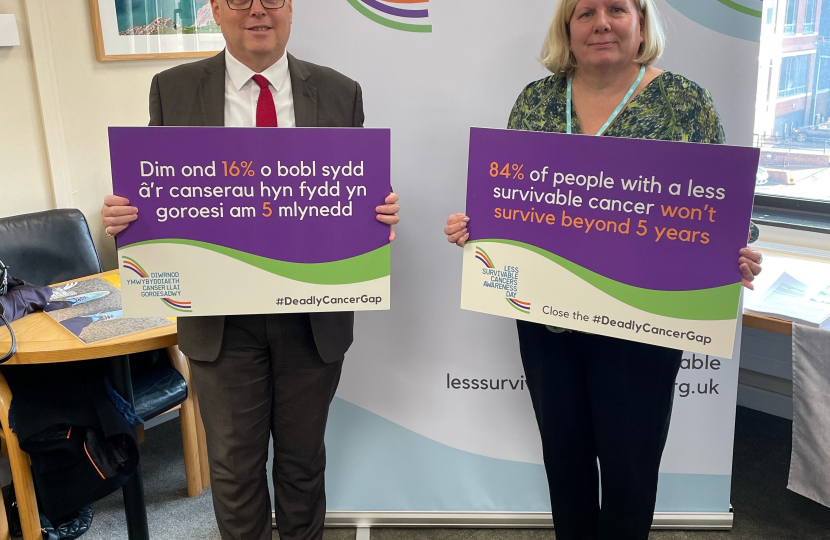
Local Senedd Member Paul Davies is supporting the Less Survivable Cancers Taskforce’s (LSCT) Less Survivable Cancers Awareness Day campaign to improve the poor survival chances of people diagnosed with cancers of the lung, liver, brain, oesophagus, pancreas or stomach.
The LSCT has released figures today, based on a new analysis of existing data and the world survival rankings of lung, liver, brain, oesophageal, pancreatic and stomach cancers, which show that Wales, and the whole of the UK, lags woefully behind other countries when it comes to patient survival.[1] The data shows that out of 33 countries of comparable wealth and income levels, Wales ranks as low as 32nd for five year survival for stomach cancer and 31st for pancreatic and lung cancers. This rises to 21st for both liver cancer and oesophageal cancer and 12th for brain cancer.[2][3] This poor survivability for less survivable cancers is similar across all UK nations. The countries with the highest five year survival rates for less survivable cancers were Korea, Belgium, USA, Australia and China and the new analysis found that, if people in the UK survived at the same rate as those in these countries, then over 8,000 lives could be saved annually.[4][5] Currently, in the UK around 15,400 people will survive for five years following a diagnosis of a less survivable cancer - if the UK had survival rates comparable to the top five performing countries, this number could be close to 24,000.[6] The LSCT is calling for all UK governments to commit to increasing survival rates for less survivable cancers by eliminating avoidable delays in diagnosis and proactively investing in research and treatment options.
Commenting on the campaign, Paul Davies said, “People currently diagnosed with these cancers face poor survival chances and urgent action must be taken to improve patient outcomes in Wales. I had the opportunity to talk to the campaign team at the Senedd recently and we discussed some of their statistics and the importance of knowing the symptoms and seeking out help if you think something may be wrong.”
He added, “I’m proud to support Less Survivable Cancers Awareness Day and I applaud the efforts of the Less Survivable Cancers Taskforce, who continue to raise awareness of these cancers and call for governments across the UK to do more to prioritise them.”
Judi Rhys MBE, Chief Executive of Tenovus Cancer Care and Chair of the Less Survivable Cancers Taskforce Wales subgroup, said: “People diagnosed with one of these six cancers still have a shockingly low life expectancy. The figures released today are concerning and it’s extremely disappointing to see how poorly Wales, and the UK, compares to our international counterparts.
“The actions we’ve repeatedly called for - targeted screening and monitoring those most at risk - would have a huge impact on survival. These latest statistics should be a strong reminder to Welsh Government of the importance of prioritising and accelerating cancer survival initiatives.
“Without concerted effort and action now, we will continue to miss opportunities to save lives.
“It’s a really positive step to see so many MSs including Paul supporting our Less Survivable Cancers Awareness Day.”
[1] 2010-2014 diagnosis period, data from CONCORD-3. Only countries with age-standardised, reliable data for each LSC considered.
[2] The data is based on research, originally published by the CONCORD programme for the world-wide surveillance of cancer survival, based in the London School of Hygiene & Tropical Medicine, during the period 2010 to 2014.
[3] See the full list of countries here
[4] The five best performing countries were found by calculating the rank of each country within each cancer and then the mean rank for each country across all cancers. Researchers then took the countries with the 5 best (i.e. lowest) mean ranks – to find the countries that, on average, perform the best across all six less survivable cancers. See the full list of countries here.
[5] Estimated by comparing the CRUK incidence projections to get the number of less survivable cancer annual cases in the 2023-2025 period. Researchers then calculated a mean average of the number of five year survivors based in each of the top five country’s survival rates and the UK incidence rates. This was then repeated using the UK survival rates. All survival rates are taken from CONCORD-3 data.
[6] Currently, in the UK 15,427 people will survive for five years following a diagnosis of a less survivable cancer - if the UK had survival rates comparable to the top five performing countries this number could be 23,775. This is a difference of 8,348 lives.

